qaiz
Pokémon Master
Jarinko Chie (Review, Film, 1981)
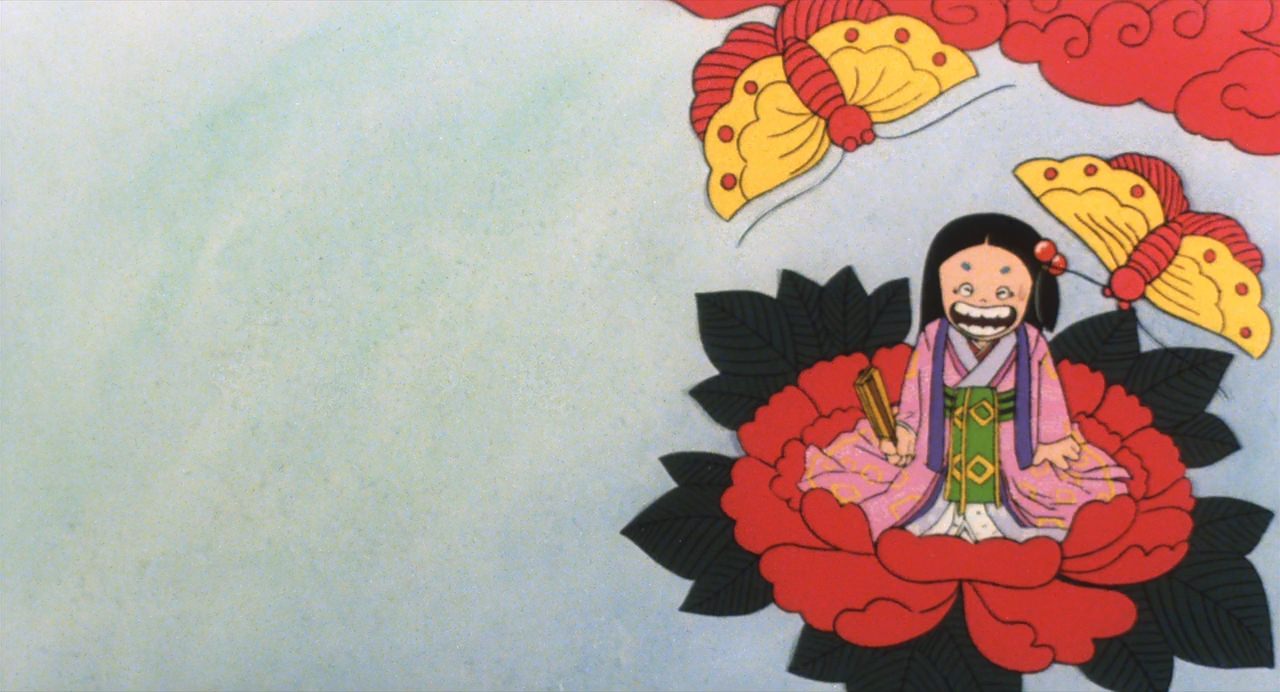
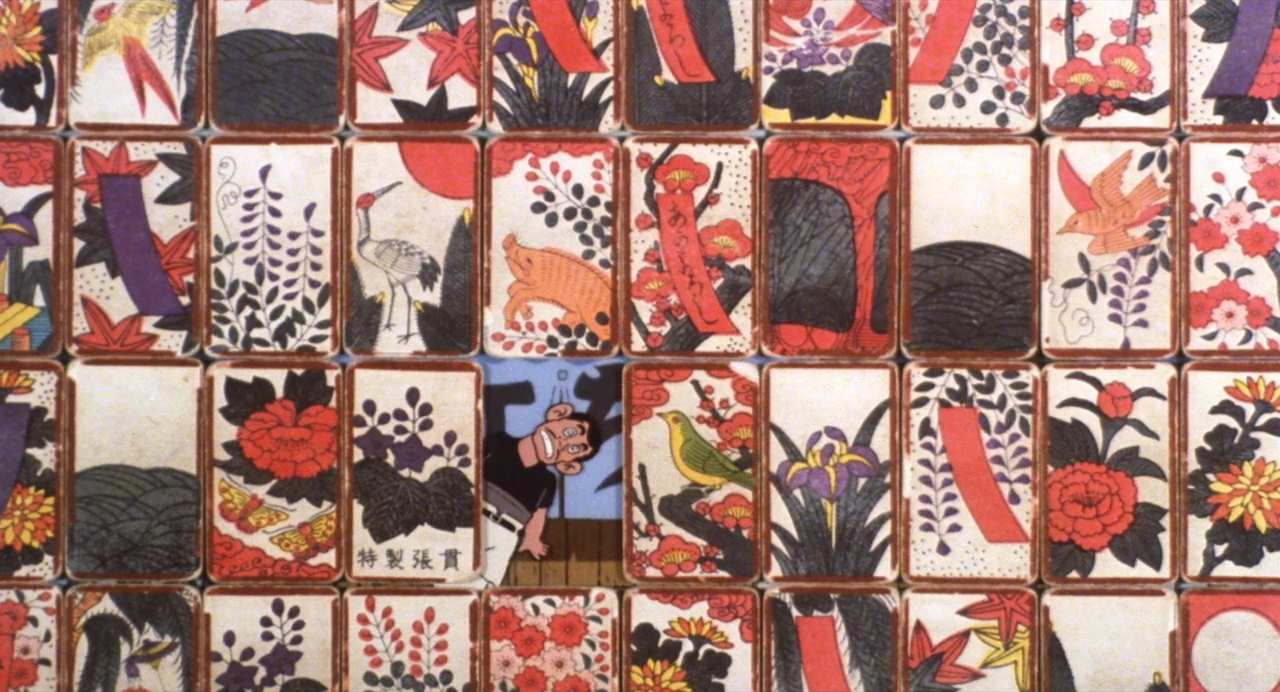
For the past 50 years Isao Takahata has worked on some of the industries most critically acclaimed films as well as some of the most beloved television series to grace the medium. A co-founder of Studio Ghibli, many of his most recognized works stem from his 32 year long tenure at the prestigious studio, however the film I'm writing about today pre-dates his Studio Ghibli debut and its an overlooked gem, a magnifying glass placed upon a fractured family unit, lovingly crafted and brimming with charm it contains all the hallmarks that you'd expect of a Takahata film from his astute understanding of everyday family life to the comedy that surrounds it, a gentle and touching tale that contains all of the heart in the world.
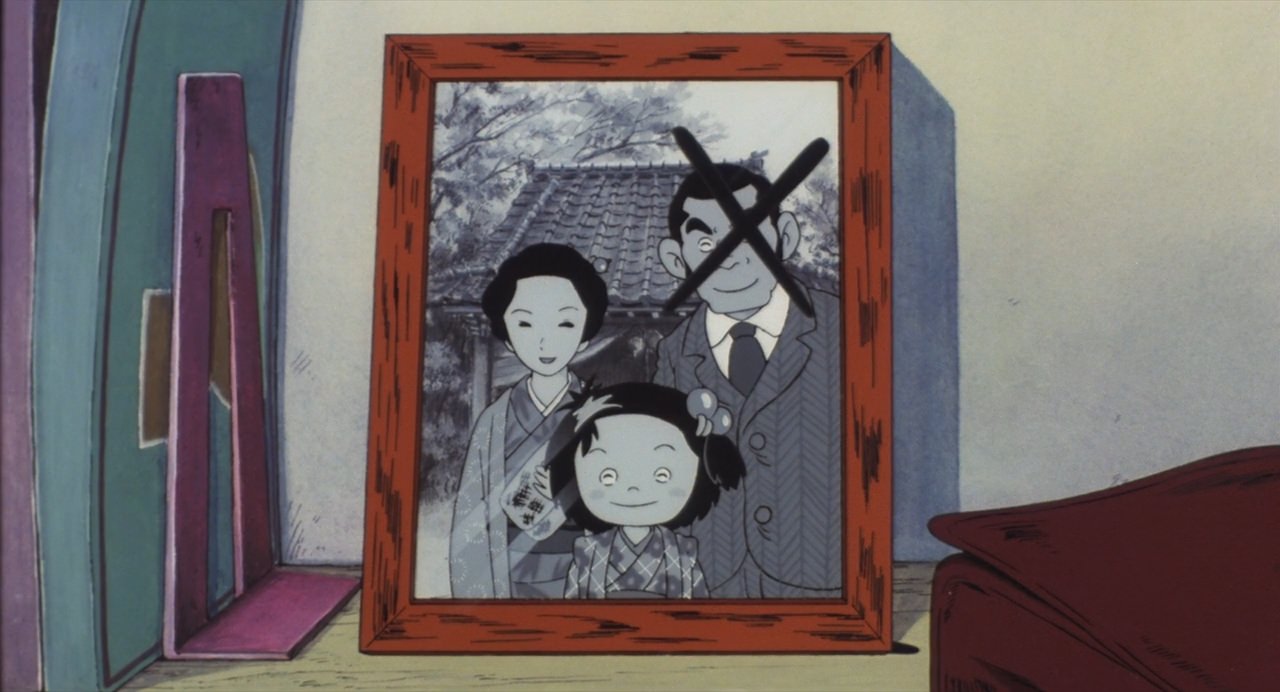
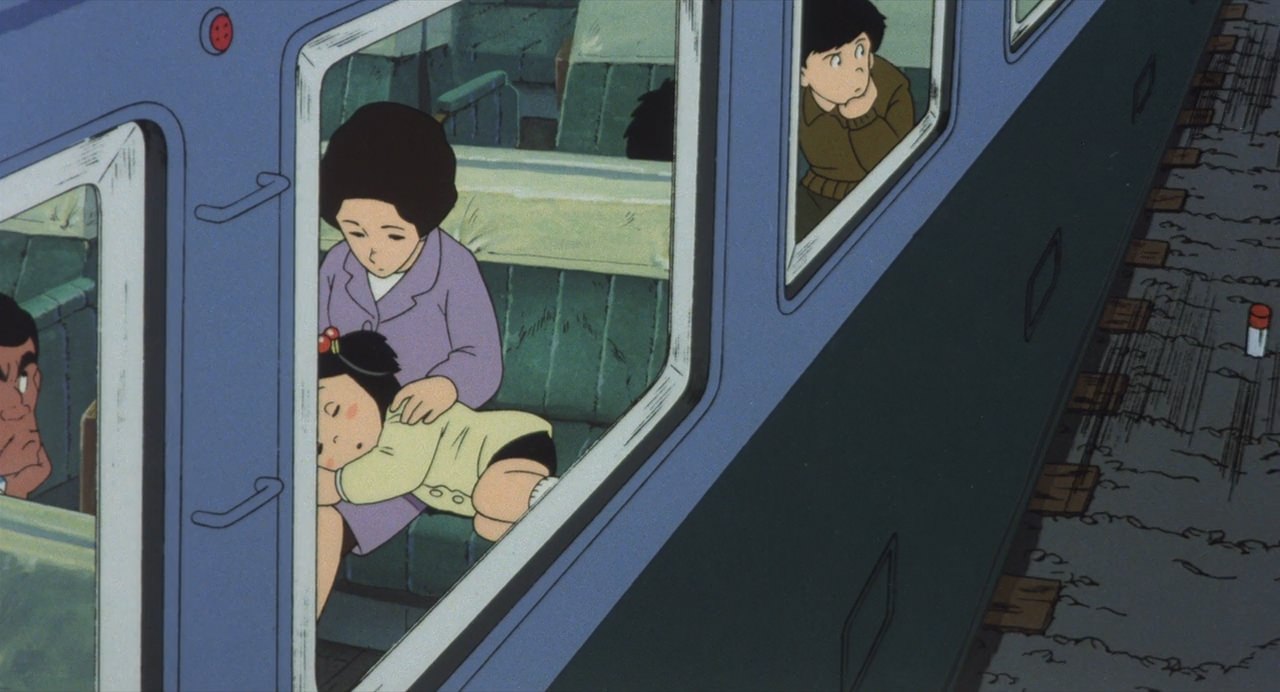
Jarinko Chie directed by the late Isao Takahata and released back on April 11th 1981 is a film adaptation of a long running manga series. Interestingly Miyazaki was originally penned to direct the film, he however declined and so Takahata took over, it's hard to predict just how this film would have turned out with Miyazaki as director but it's safe to say that Takahata was a perfect choice for the material at hand. After the film released Takahata went on to direct the Jarinko Chie television series only a few months later and so it's safe to say that he developed an affinity for the world and its characters and it's easy to see why, after all a film about the interactions between family members is what Takahata excels at. Jarinko Chie takes place in 1960's Osaka and revolves around Chie, a ten year old girl who lives with her single father, a brute who fights and gambles all of his money away. Chie spends her days juggling both school and her job at her families diner. The film opens with Chie's father begging his old man to lend him money due to Chie's waning health, of course he's lying about her condition as a means to obtain more money in order to gamble and gamble he does, losing all of the money to the owner of a local gambling parlour. The premise may sound depressing however what makes Jarinko Chie work is its humour, make no mistake this is a comedy. In the very next scene for example Chie spots a cat meowing timidly and tosses it a skewer to eat, the cat grabs the skewer, gets up onto two legs and walks up to a trash can, leaning against it cockily as he eats, cartoon testicles in sight not unlike the Tanuki in Pom Poko, another Takahata film. Jarinko Chie is a comedy and the fantastic voice acting is the backbone that makes up the humour, a majority of the cast in fact originate from popular manzai groups from Osaka, a traditional style of Japanese stand-up comedy.
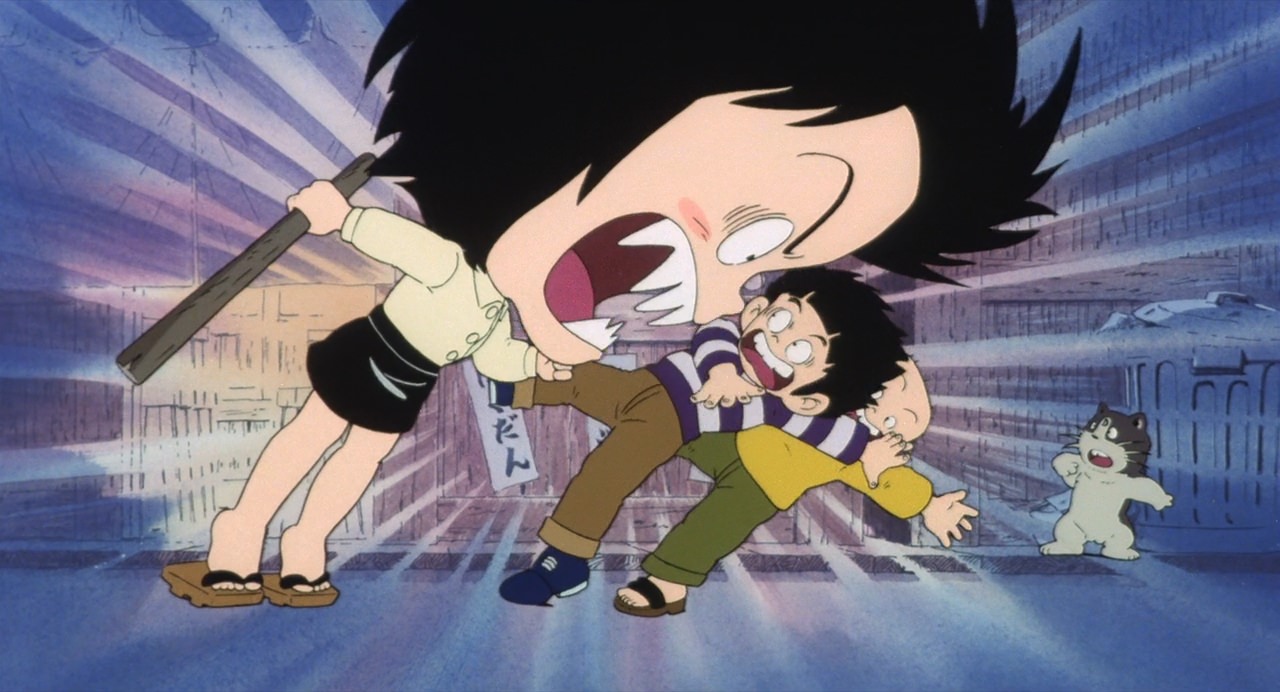
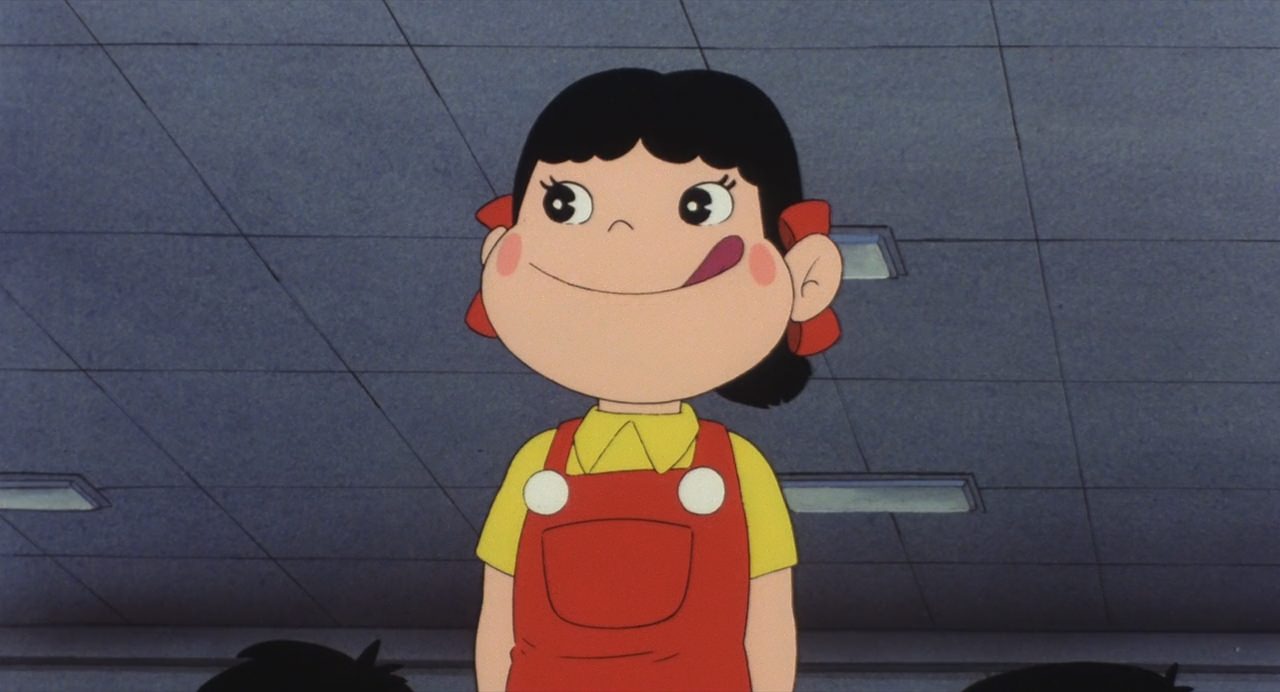
Like Takahata's other films Jarinko Chie has a beautiful aesthetic. It's not as detailed as Only Yesterday nor unconventional like The Tale of Princess Kaguya however similarly to the two aforementioned films it's both pretty and fully realized. Backgrounds are painterly and detailed, and although a vast majority of the film utilises medium and two shots we do get some nice establishing shots that set the tone and place. Since this is a film pertaining a close-knit family the camera is often close and fixated on characters. The film itself seems to be made up of around 20 chapters and although there's an overarching theme to the film Chie finds herself in various predicaments throughout the 1 hour 50 min runtime, each taking place in a different location, almost play-like in its structure. The backgrounds are homely and appealing and make for a beautiful and accurate rendition of 60's Osaka, even today you'll notice many famous landmarks adorning the backgrounds.
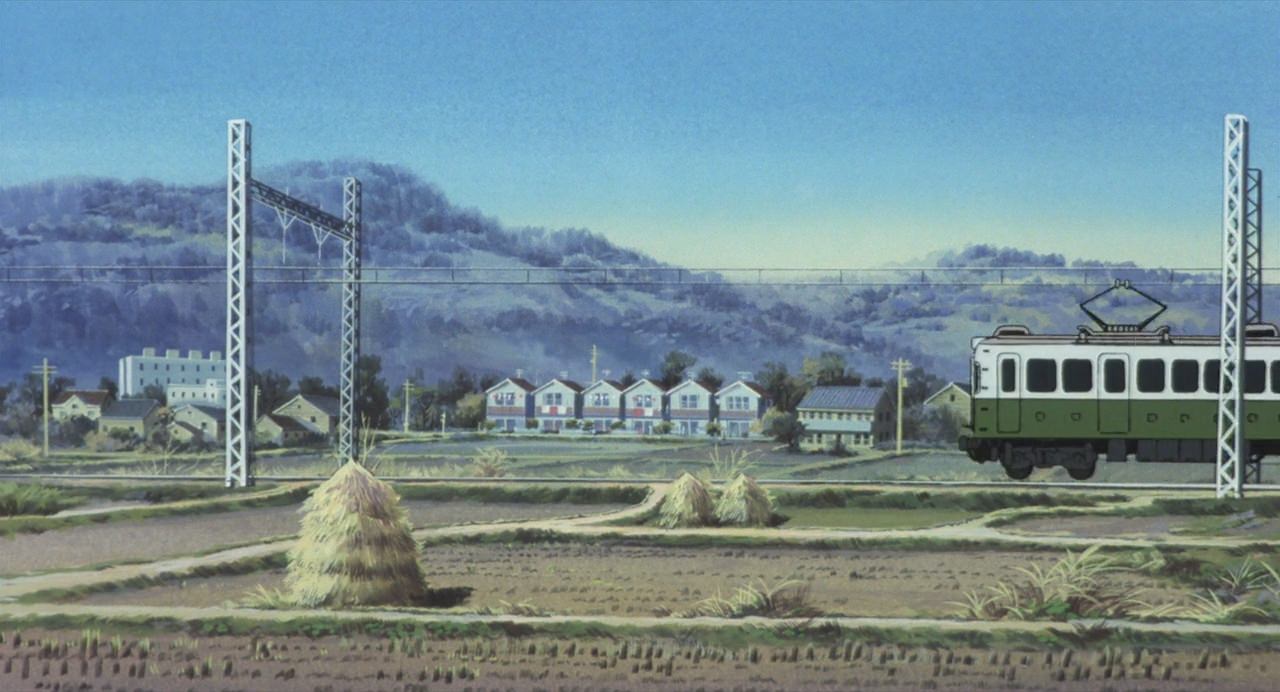
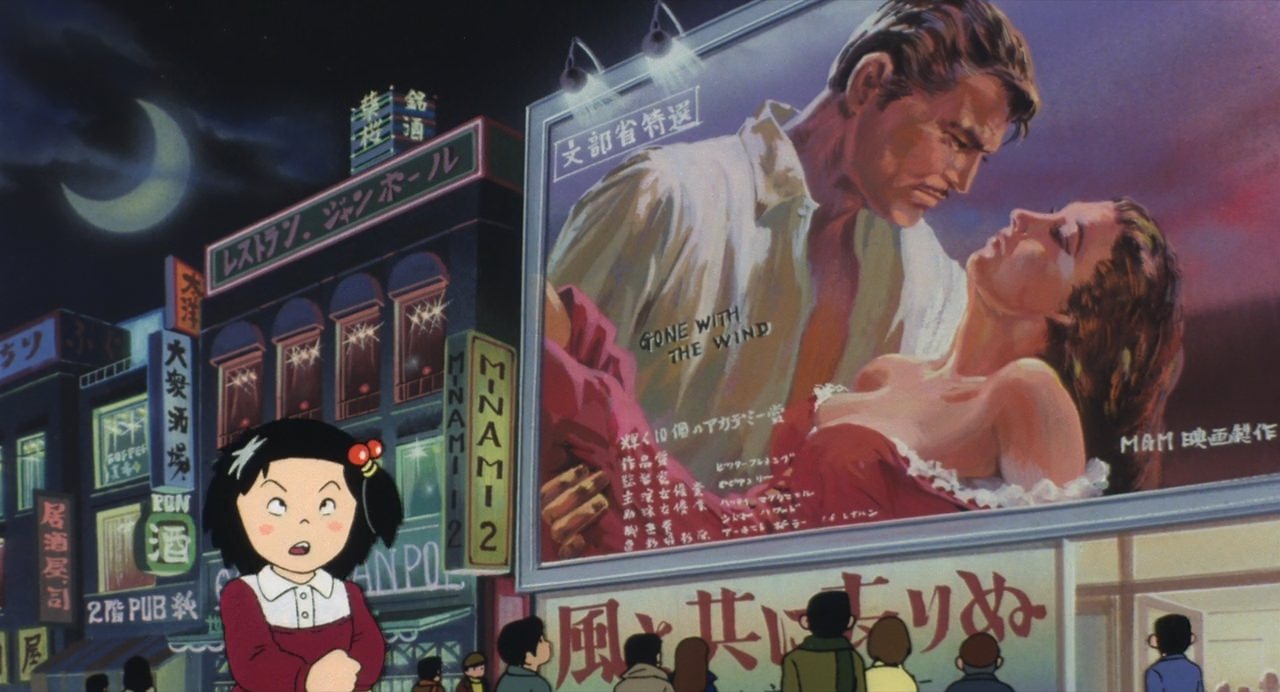
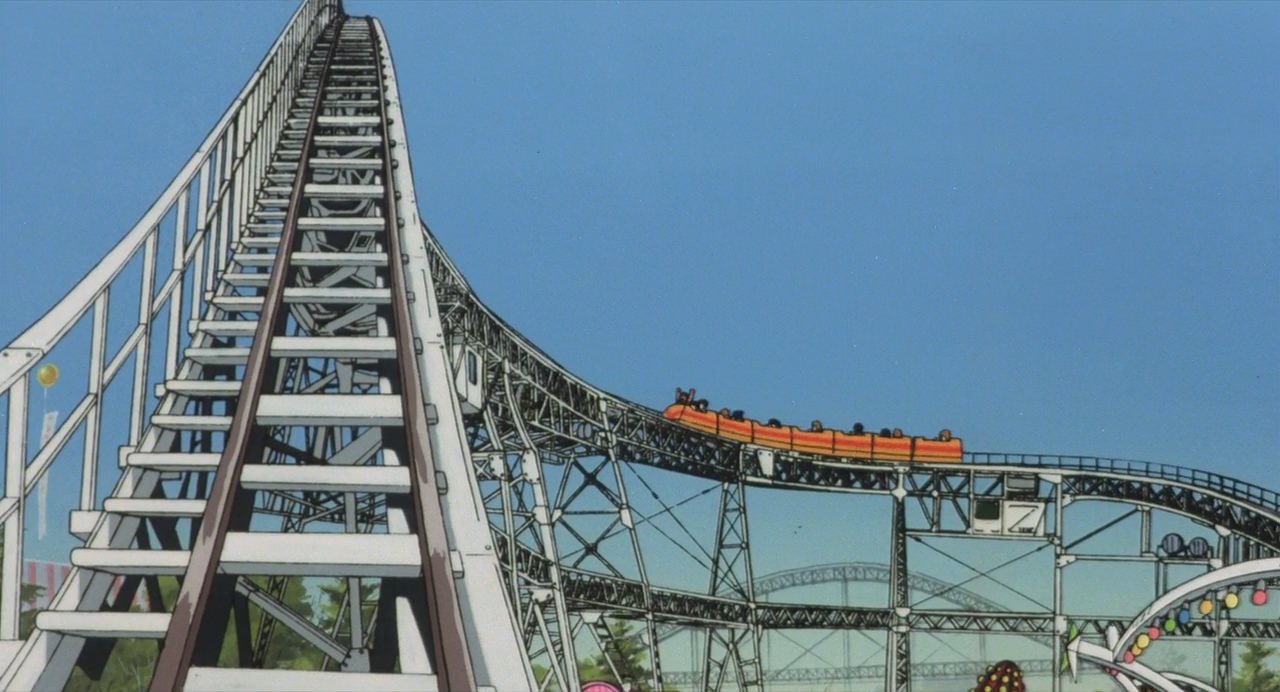
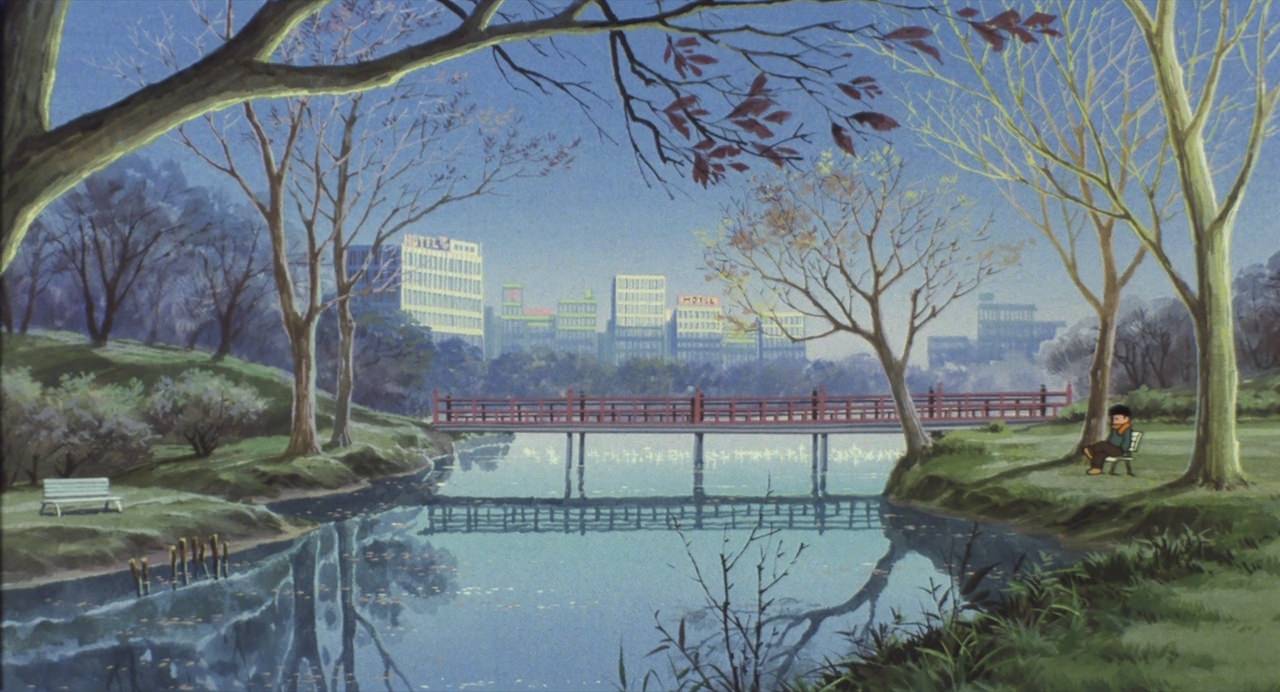
As the film progresses Chie comes into contact with her mother, unbeknownst to Chie's father. These scenes are lovely and showcase Takahata's masterful ability to depict complex familial relationships through simple visual storytelling. Pillow shots give scenes room to breathe, the camera often lingers as the characters fall into a deep thought, monologuing their predicament. There's many fantastic scenes in this film however there's one scene in particular that I want to delve into and its impact was profound and surprising. It's because of its surprising nature that I initially thought to refrain from spoiling this scene however I felt that it would be a disservice not to discuss it, I also felt that perhaps bringing to light this scene would convince people to earnestly give this film a shot. Whilst spending time with one another at the park both Chie and her mother go to the cinema, and here we're presented with a clip from the live action 1967 film The Son of Godzilla. The scene shown in particular is of Godzilla and his son Minilla. In this father-son moment, Godzilla lets out his atomic breath and then gestures to Minilla to do the same, however all he can muster up is a smoke ring, Chie and her mother laugh, Godzilla gestures to Minilla to have another go and as his son gears up to try again Godzilla steps on his tail and a full blown atomic breath is let forth, Godzilla then embraces his son. Minilla like Chie lacks confidence and although Godzilla's tactics for surfacing Minilla's inner hidden abilities is comedic it's still touching. It's a poignant scene, one that could've easily been animated in order to conform to the visuals of Jarinko Chie and yet Takahata decided to place a live action film inside of the animated world and the two styles juxtapose beautifully. It's this type of out of the box and unconventional film-making that placed Takahata in a league of his own.
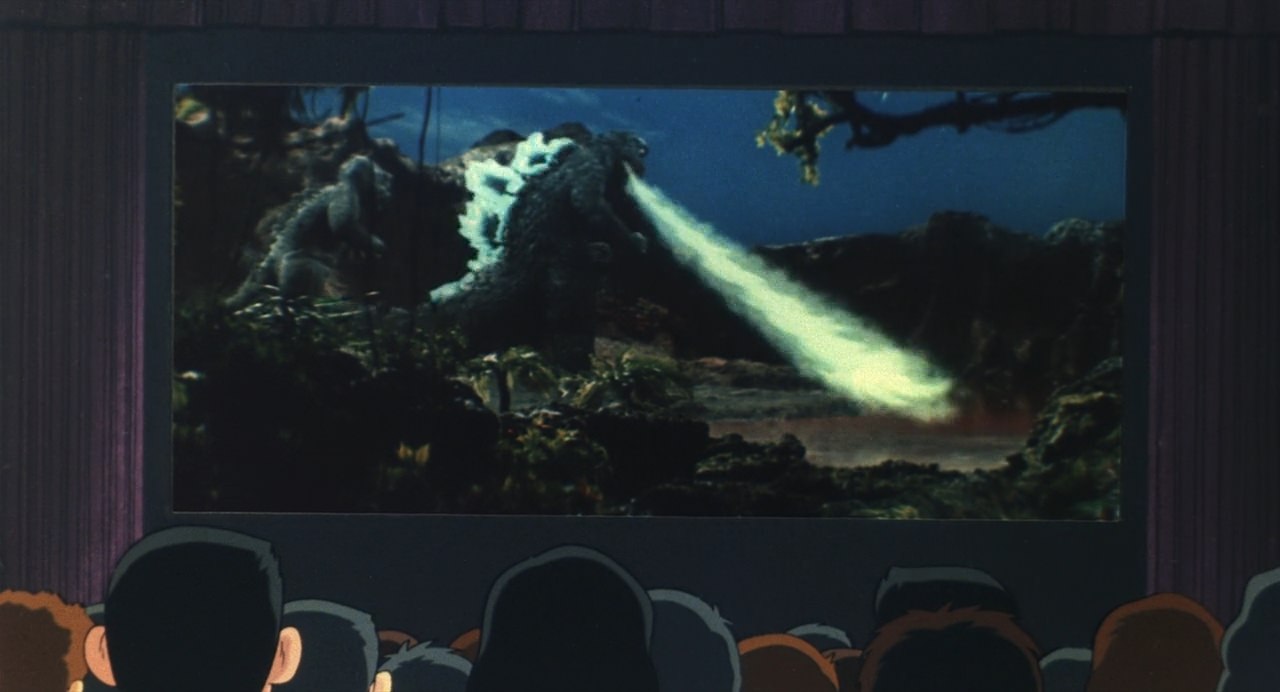
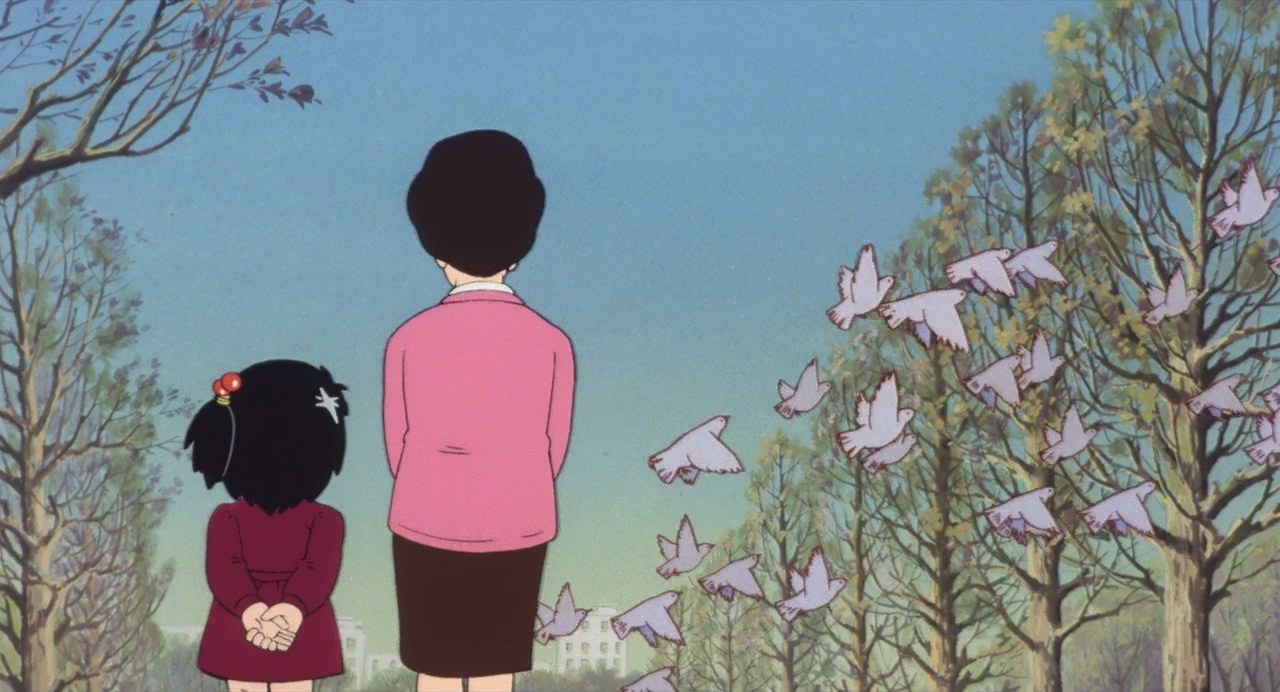
The soundtrack scored by Masaru Hoshi is lovely, enhancing each and every scene. Like many of Takahata's other works the film isn't afraid of silence, sometimes the silence heightens the comedic scenes and other times it's used in order to intensify the emotional moments. Ambient sounds such as birds chirping or the clanging of trains creates a sense of place, bringing the world to life. Also, it bears mentioning that unconventionally all of the dialogue was recorded before the animation, clearly this has an impact on the way in which characters are animated and it makes for a real connection between the two, even-though the film is animated and character designs are exaggerated nevertheless it really does feel like a live action film. The characters are believable and I instantly became immersed in this little group of characters and their lives, invested in their journey. I absolutely adore Chie's design, from her large head and tiny doll like eyes to her massive, larger than life grin and teeth, the juxtaposition between her and her more refined and elegant mother is sweet, I got a real sense that the two were slightly envious of each other, Chie's young and yet she's a real go-getter, the glue that keeps the family together, always happy and smiling, of course as the viewer we're also privy to those moments in which she is less certain in her own abilities.
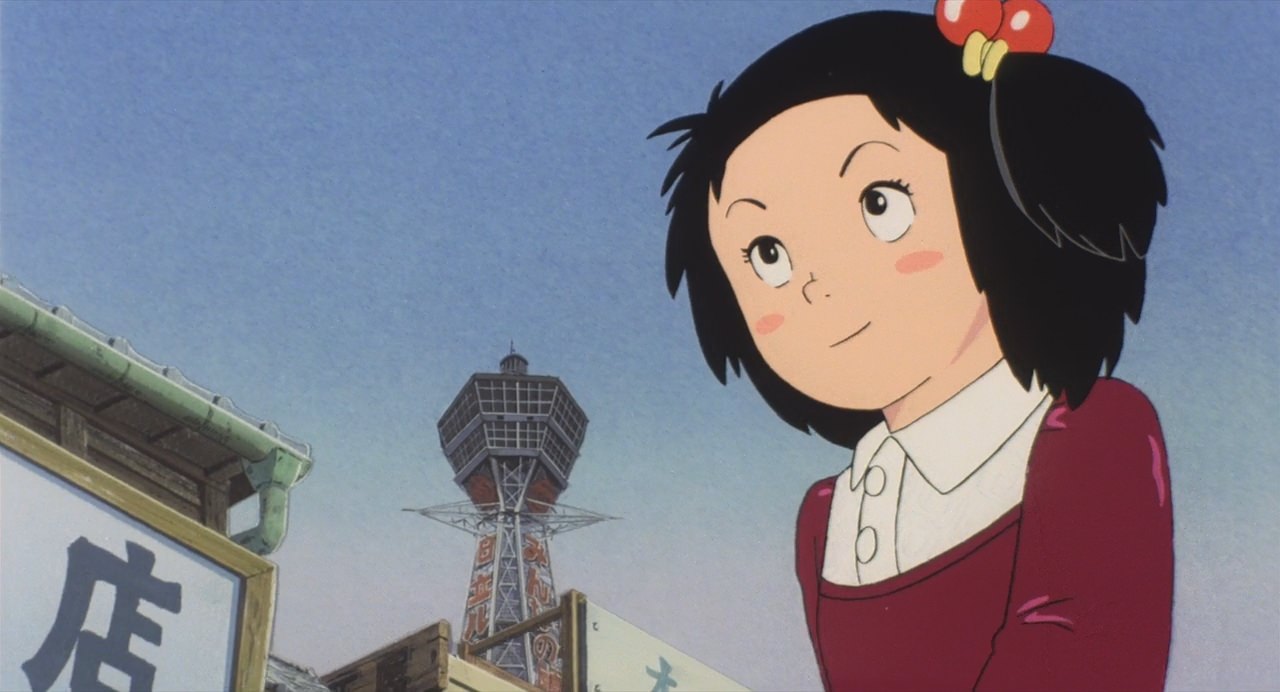
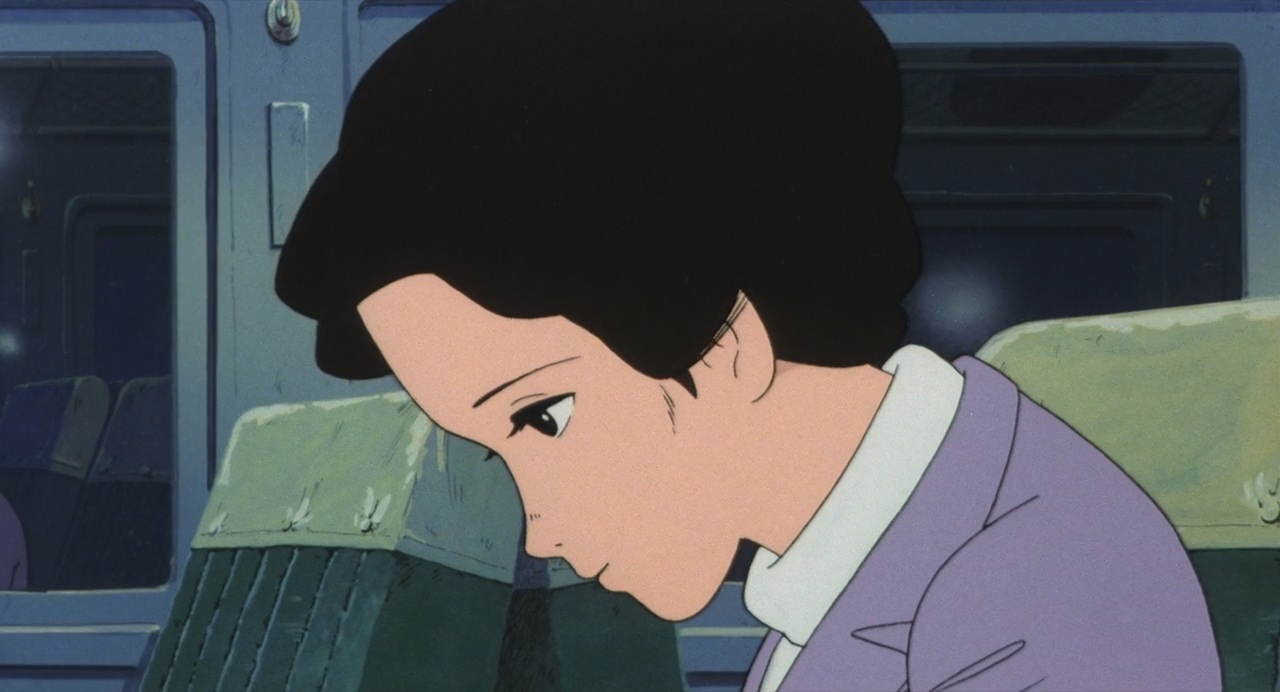
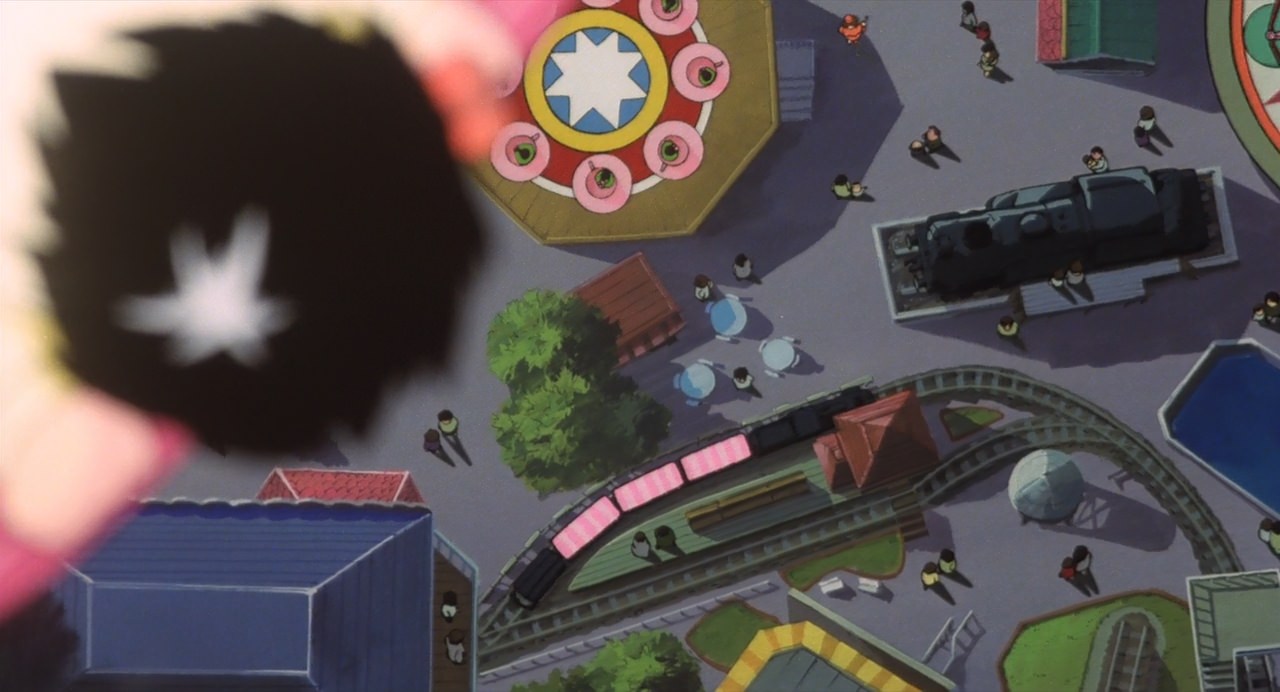
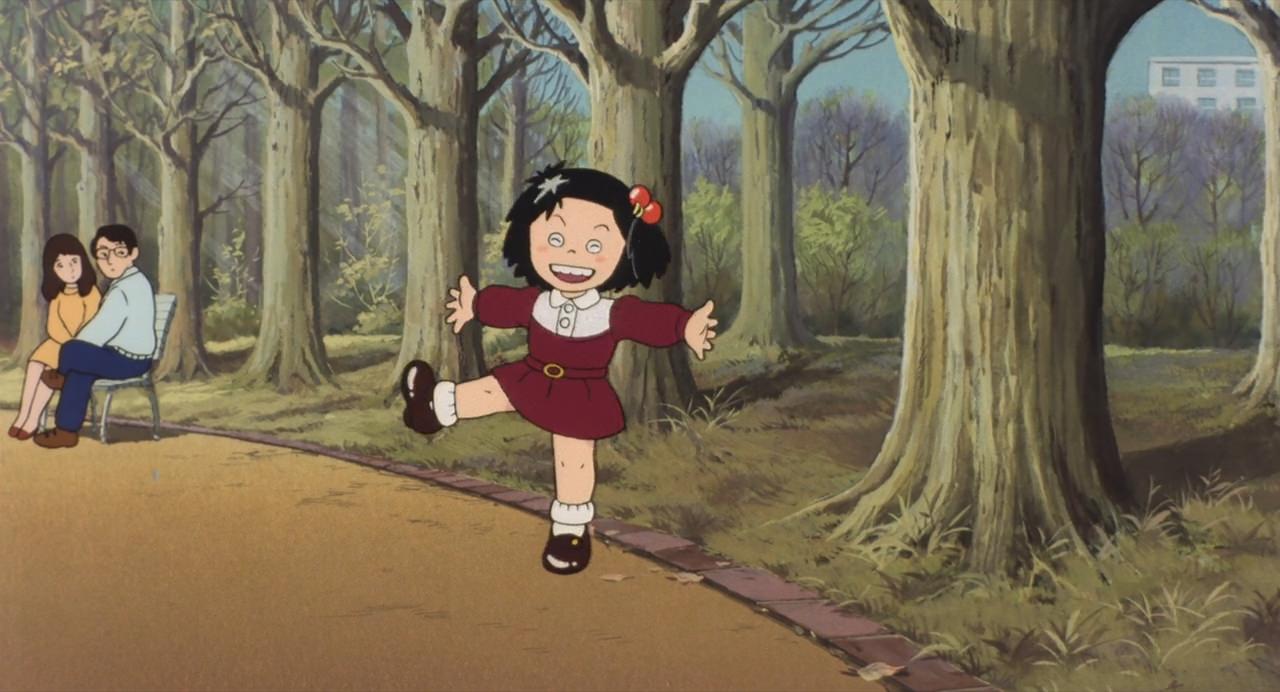
Even-though this is one of Takahata's earlier works you really get a clear sense of his abilities, even at this stage. As I mentioned earlier Jarinko Chie is broken up into chapters, little vignettes that capture everyday life within Chie's household, this structure is similar to My Neighbors the Yamadas, a later Takahata film. A soft and delicate film about everyday life, the thoughtfulness that's applied to the ways in which the characters interact with one another also reminiscent of Yamadas. The deliberate pace in which the film meanders from scene to scene evocative of Only Yesterday, and of course the anthropomorphic cat with prominent testicles, a key element of this film made a similar return in Pom Poko 13 years later. Although Takahata was known for his films that tackled serious matters, even Pom Poko, a film with an oddball cast and aesthetic is enshrouded in a serious plot about the environment. It's evident that Takahata had an understanding of comedy, utilizing it beautifully throughout his 50 year long portfolio. At the end of the day some of the funniest moments occur within otherwise unassuming households, moments between loved ones, forever living in the hearts and minds of those close to us, never to be forgotten, undoubtedly the memories we all have of Takahata and his films will too live on for eternity.
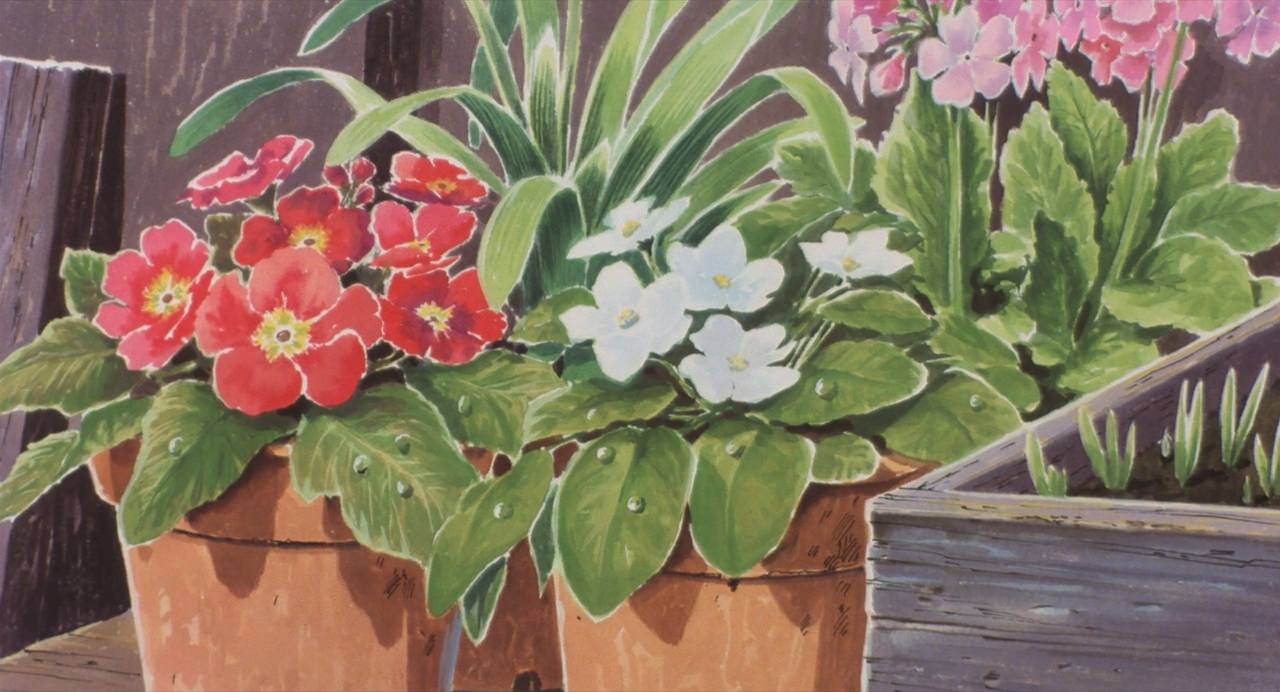
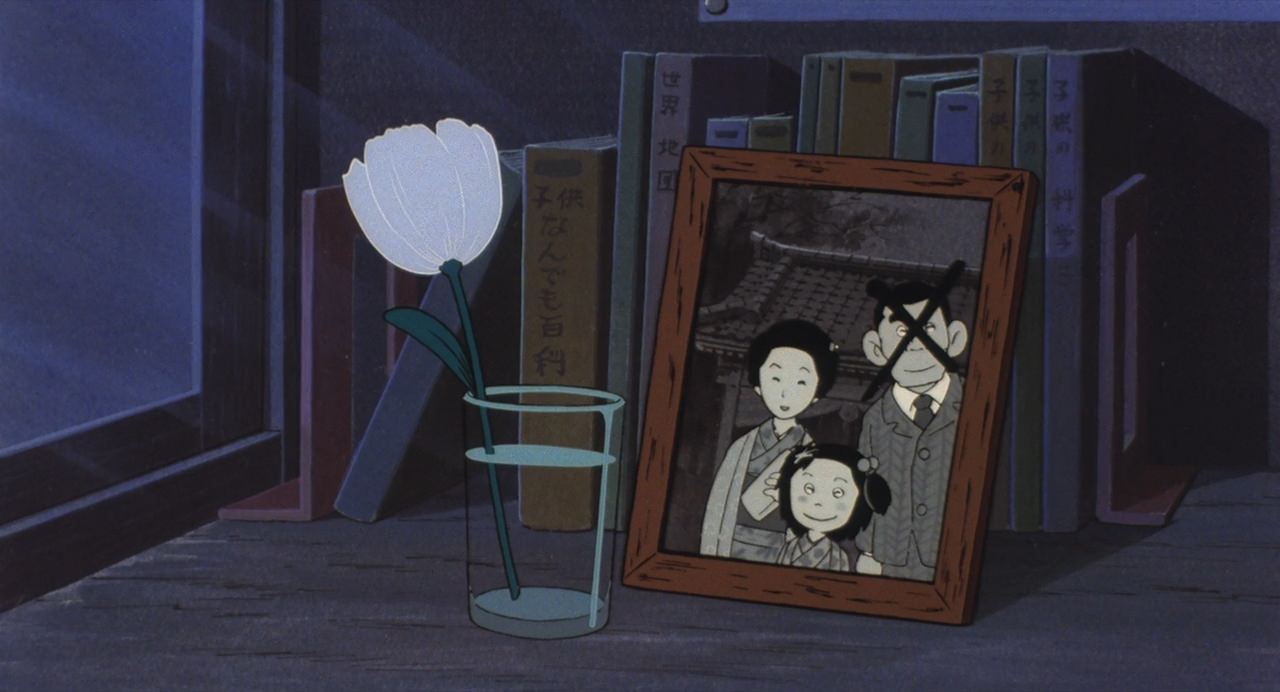


For the past 50 years Isao Takahata has worked on some of the industries most critically acclaimed films as well as some of the most beloved television series to grace the medium. A co-founder of Studio Ghibli, many of his most recognized works stem from his 32 year long tenure at the prestigious studio, however the film I'm writing about today pre-dates his Studio Ghibli debut and its an overlooked gem, a magnifying glass placed upon a fractured family unit, lovingly crafted and brimming with charm it contains all the hallmarks that you'd expect of a Takahata film from his astute understanding of everyday family life to the comedy that surrounds it, a gentle and touching tale that contains all of the heart in the world.


Jarinko Chie directed by the late Isao Takahata and released back on April 11th 1981 is a film adaptation of a long running manga series. Interestingly Miyazaki was originally penned to direct the film, he however declined and so Takahata took over, it's hard to predict just how this film would have turned out with Miyazaki as director but it's safe to say that Takahata was a perfect choice for the material at hand. After the film released Takahata went on to direct the Jarinko Chie television series only a few months later and so it's safe to say that he developed an affinity for the world and its characters and it's easy to see why, after all a film about the interactions between family members is what Takahata excels at. Jarinko Chie takes place in 1960's Osaka and revolves around Chie, a ten year old girl who lives with her single father, a brute who fights and gambles all of his money away. Chie spends her days juggling both school and her job at her families diner. The film opens with Chie's father begging his old man to lend him money due to Chie's waning health, of course he's lying about her condition as a means to obtain more money in order to gamble and gamble he does, losing all of the money to the owner of a local gambling parlour. The premise may sound depressing however what makes Jarinko Chie work is its humour, make no mistake this is a comedy. In the very next scene for example Chie spots a cat meowing timidly and tosses it a skewer to eat, the cat grabs the skewer, gets up onto two legs and walks up to a trash can, leaning against it cockily as he eats, cartoon testicles in sight not unlike the Tanuki in Pom Poko, another Takahata film. Jarinko Chie is a comedy and the fantastic voice acting is the backbone that makes up the humour, a majority of the cast in fact originate from popular manzai groups from Osaka, a traditional style of Japanese stand-up comedy.


Like Takahata's other films Jarinko Chie has a beautiful aesthetic. It's not as detailed as Only Yesterday nor unconventional like The Tale of Princess Kaguya however similarly to the two aforementioned films it's both pretty and fully realized. Backgrounds are painterly and detailed, and although a vast majority of the film utilises medium and two shots we do get some nice establishing shots that set the tone and place. Since this is a film pertaining a close-knit family the camera is often close and fixated on characters. The film itself seems to be made up of around 20 chapters and although there's an overarching theme to the film Chie finds herself in various predicaments throughout the 1 hour 50 min runtime, each taking place in a different location, almost play-like in its structure. The backgrounds are homely and appealing and make for a beautiful and accurate rendition of 60's Osaka, even today you'll notice many famous landmarks adorning the backgrounds.




As the film progresses Chie comes into contact with her mother, unbeknownst to Chie's father. These scenes are lovely and showcase Takahata's masterful ability to depict complex familial relationships through simple visual storytelling. Pillow shots give scenes room to breathe, the camera often lingers as the characters fall into a deep thought, monologuing their predicament. There's many fantastic scenes in this film however there's one scene in particular that I want to delve into and its impact was profound and surprising. It's because of its surprising nature that I initially thought to refrain from spoiling this scene however I felt that it would be a disservice not to discuss it, I also felt that perhaps bringing to light this scene would convince people to earnestly give this film a shot. Whilst spending time with one another at the park both Chie and her mother go to the cinema, and here we're presented with a clip from the live action 1967 film The Son of Godzilla. The scene shown in particular is of Godzilla and his son Minilla. In this father-son moment, Godzilla lets out his atomic breath and then gestures to Minilla to do the same, however all he can muster up is a smoke ring, Chie and her mother laugh, Godzilla gestures to Minilla to have another go and as his son gears up to try again Godzilla steps on his tail and a full blown atomic breath is let forth, Godzilla then embraces his son. Minilla like Chie lacks confidence and although Godzilla's tactics for surfacing Minilla's inner hidden abilities is comedic it's still touching. It's a poignant scene, one that could've easily been animated in order to conform to the visuals of Jarinko Chie and yet Takahata decided to place a live action film inside of the animated world and the two styles juxtapose beautifully. It's this type of out of the box and unconventional film-making that placed Takahata in a league of his own.


The soundtrack scored by Masaru Hoshi is lovely, enhancing each and every scene. Like many of Takahata's other works the film isn't afraid of silence, sometimes the silence heightens the comedic scenes and other times it's used in order to intensify the emotional moments. Ambient sounds such as birds chirping or the clanging of trains creates a sense of place, bringing the world to life. Also, it bears mentioning that unconventionally all of the dialogue was recorded before the animation, clearly this has an impact on the way in which characters are animated and it makes for a real connection between the two, even-though the film is animated and character designs are exaggerated nevertheless it really does feel like a live action film. The characters are believable and I instantly became immersed in this little group of characters and their lives, invested in their journey. I absolutely adore Chie's design, from her large head and tiny doll like eyes to her massive, larger than life grin and teeth, the juxtaposition between her and her more refined and elegant mother is sweet, I got a real sense that the two were slightly envious of each other, Chie's young and yet she's a real go-getter, the glue that keeps the family together, always happy and smiling, of course as the viewer we're also privy to those moments in which she is less certain in her own abilities.




Even-though this is one of Takahata's earlier works you really get a clear sense of his abilities, even at this stage. As I mentioned earlier Jarinko Chie is broken up into chapters, little vignettes that capture everyday life within Chie's household, this structure is similar to My Neighbors the Yamadas, a later Takahata film. A soft and delicate film about everyday life, the thoughtfulness that's applied to the ways in which the characters interact with one another also reminiscent of Yamadas. The deliberate pace in which the film meanders from scene to scene evocative of Only Yesterday, and of course the anthropomorphic cat with prominent testicles, a key element of this film made a similar return in Pom Poko 13 years later. Although Takahata was known for his films that tackled serious matters, even Pom Poko, a film with an oddball cast and aesthetic is enshrouded in a serious plot about the environment. It's evident that Takahata had an understanding of comedy, utilizing it beautifully throughout his 50 year long portfolio. At the end of the day some of the funniest moments occur within otherwise unassuming households, moments between loved ones, forever living in the hearts and minds of those close to us, never to be forgotten, undoubtedly the memories we all have of Takahata and his films will too live on for eternity.


